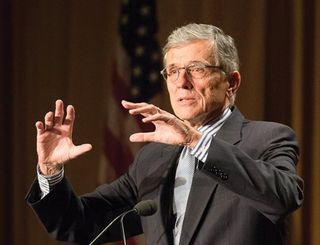Wheeler: Hard To Envision AT&T Sitting Out Auction

FCC chairman Tom Wheeler said Wednesday, and more than once, that he fully expected AT&T to bid in the upcoming broadcast incentive auction.
AT&T last week warned the FCC that if it limits the amount of low-band spectrum in the broadcast 600 MHz spectrum band incentive auction, it could put the company in an untenable position and jeopardize its participation in the auction.
The FCC is widely expected to circulate Thursday an item with changes to its local market spectrum screen that would include limits on low-band spectrum holdings in individual markets.
At a press conference Wednesday, following the FCC's April public meeting, Wheeler was asked about AT&T's "threat" not to participate.
"Anybody who has advocated so hard for additional spectrum: it would be hard to conceive of them not participating in the opportunity to get the spectrum. They have made a really good case as to why there is a need for more spectrum, and I think they were speaking factually."
But he wasn't done. Later in the press conference, he circled back. "I find it hard to believe that somebody who has advocated so forcefully about why it is absolutely essential that they have spectrum like this would pass on the opportunity."
And again, a little later, when asked if he was not taking AT&T's threat seriously: "The wireless carriers including AT&T have been very forceful and persuasive in making the case that the success of their ability to serve consumers and therefore the success of their business depends on additional spectrum. I have a hard time envisioning this once in a lifetime opportunity for this kind of beachfront spectrum being something that people throw up their hands and walk away from."
Broadcasting & Cable Newsletter
The smarter way to stay on top of broadcasting and cable industry. Sign up below
AT&T has argued that its issue is with how little spectrum it would be able to bid for if limits were imposed.
In a meeting last week with Wheeler legal advisor Renee Gregory, Joan Marsh, VP of federal regulatory, AT&T, said that as the company understood the aggregation item, after a certain aggregate threshold is reached in the broadcast spectrum auction, certain bidding restrictions will be imposed on anyone with more than a third of available low-band spectrum. That, said AT&T, would restrict its participation in markets covering 70% of U.S. POPs ("POPs generally refers to the number of people in a specific area where wireless services are available [the population],”) according to CTIA: The Wireless Association. Verizon would be in the same position of being restricted in many markets.
Wheeler bristled at the suggestion the FCC might be working on a way to compel AT&T to participate. "Nobody is compelling anybody to participate in the spectrum auction," he said. "Whether the broadcasters sell or the wireless carriers buy is entirely a function of their own free will and the marketplace that we create."
The FCC does not want to discourage participation in the auction, but has signaled it also does not want low-band spectrum concentrated in too few hands. The FCC has three auctions in which to raise funds for FirstNet, the interoperable broadband communications network, and to recoup the expenses of the auction and pay broadcasters for clearing off spectrum, though statutorily it is only obligated to cover the auction costs and pay broadcasters for their spectrum or the expense of moving and repacking them to make room for wireless carriers bidding for that broadcast spectrum.
An AT&T spokesperson declined comment, but referred B&C to an earnings call Tuesday (April 22), on which AT&T CFO John Stephens talked about participation in the auction and the spectrum moves AT&T has already made.
Credit Suisse analyst Joseph Mastrogiovanni asked about AT&T "potentially reevaluating [its] participation in the broadcast auctions" and how much it needed low-band vs. mid-band spectrum."
"We would like to participate at the auction," said Stephens. "We are and have been working with the Commission to establish auction rules that will certainly promote a good result for AT&T but will also promote a successful result for the auction. So we are interested in participating.
That said he indicated the company's success in getting access to spectrum was not wedded to the FCC auction.
"I am very pleased to get the Leap transaction done and that we were able to work through with the SEC and the DOJ to get that completed," he said. "The unutilized spectrum that we have available to us immediately in over 200 markets that our team is putting into service right now will help us in quality service and dealing with the network demands.
"we feel pretty good about our spectrum position right now. We feel like we have positioned ourselves well with the transactions and the spectrum deals we've done over the last few years...."
AT&T has made the argument that in a data-, rather than voice, driven world, low-band's beachfront status is mooted by the fact that capacity, rather than propagation, is the key.
Contributing editor John Eggerton has been an editor and/or writer on media regulation, legislation and policy for over four decades, including covering the FCC, FTC, Congress, the major media trade associations, and the federal courts. In addition to Multichannel News and Broadcasting + Cable, his work has appeared in Radio World, TV Technology, TV Fax, This Week in Consumer Electronics, Variety and the Encyclopedia Britannica.

